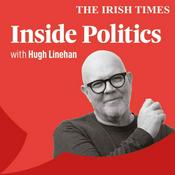176 episodes
- Keir Starmer may have survived a political near-death experience last week. But with a perilous by-election looming and punishing May elections on the horizon, few in Westminster think the prime minister is truly in the clear.
With fresh jeopardy ahead, could Starmer become the fifth prime minister in a decade to fall short of a full term?
This week on Westminster Insider, host Patrick Baker asks: why don’t UK prime ministers last anymore?
Political historian and host of the Past, Present, Future podcast David Runciman argues the revolving door at the top reflects a wider global surge in political instability — driven above all by economic turbulence.
Former Downing Street communications directors Katie Perrior, Lee Cain and James Lyons lift the lid on how Britain’s unforgiving 24/7 media machine is grinding down modern premiers.
David Lammy's former adviser Ben Judah and the Institute for Government’s Jill Rutter probe whether the civil service is helping — or hindering — an era of increasingly fragile premierships.
And the author and historian Anthony Seldon says a “massive collapse” in prime ministerial experience means many new arrivals in Downing Street are stepping into the job unprepared for the demands of governing.
Learn more about your ad choices. Visit megaphone.fm/adchoices - As Keir Starmer flies to Germany for the Munich Security Conference, Westminster Insider Host Sascha O'Sullivan finds out if the Prime Minister's time abroad has damaged him here at home – and if it has, if it's been worth it.
Sascha spoke to half a dozen current or former Labour advisors or government insiders about Starmer's approach to foreign policy. With the help of POLITICO Foreign and Defense Correspondent Esther Webber, she pieces together Starmer's legacy on the world stage.
Olivia O'Sullivan, director of UK in a Changing World at Chatham House, says the Prime Minister has managed to secure "the least worst option" with Donald Trump.
And Peter Ricketts, former head of the U.K.'s diplomatic service, said the shift towards “a hyper-personalized world” demands Starmer’s presence.
“Unless you are in the room with Donald Trump, you're not influencing him," Ricketts added.
Learn more about your ad choices. Visit megaphone.fm/adchoices - After the most difficult week of Keir Starmer's premiership, with mounting speculation over how long he can last as Prime Minister, this week on Westminster Insider, host Patrick Baker explores Labour's long and not-too-illustrious history of failed coups and botched insurrections.
Former Home Secretary Alan Johnson remembers the "curry house plot" in 2006 that forced Tony Blair to bring forward his departure from office and urges Starmer "not to let himself be forced out".
One of those at the heart of "balti-gate" as it became known, ex-Labour MP Sion Simon, explains how being well-organised and having a viable successor in Gordon Brown made all the difference.
Labour peer Ayesha Hazarika and The Independent's John Rentoul remember the one-man kamikaze mission that was ex-Culture Secretary James Purnell's hapless bid to oust Gordon Brown, and reflect on why the Tory party seem to be much more efficient at removing leaders.
Former Jeremy Corbyn adviser Andrew Fisher describes what it was like to be on the receiving end of multiple failed attempts by Labour MPs to remove the then Labour leader, pointing to the power of the Labour membership - a factor which could mean Labour is now more ripe for a change at the top than the famously regicidal Conservative party.
POLITICO's Dan Bloom takes us through the dramatic week in Westminster, with Number 10 engulfed by the revelations about Peter Mandelson.
Labour insider Sienna Rodgers of Parliament's The House magazine outlines who she believes might be in the strongest position to challenge Keir Starmer.
And politics expert Richard Johnson, an academic at Queen Mary University, illuminates the complex tangle of rules and procedures that any would-be Labour challenger needs to follow to depose Keir Starmer.
Learn more about your ad choices. Visit megaphone.fm/adchoices - As another year of political mayhem beckons, host Patrick Baker dusts off the crystal ball to see what’s in store in 2026, both in Westminster and around the world.
POLITICO's Dan Bloom and Annabelle Dickson explain what's at stake at the crucial May elections in Scotland and Wales — and how dire results for Labour could lead to a very real leadership challenge against the prime minister.
Dan and Annabelle set the scene for the King's Speech, scheduled for mid-May, and set out the massive challenges the Government faces on a host of domestic fronts including immigration and welfare.
Jack Blanchard, POLITICO Playbook managing editor and author in Washington D.C., paints a picture of what we can expect in Trump's America in 2026; highly-charged midterms, crucial Supreme court decisions, multiple foreign policy skirmishes and …. a UFC fight on the White House lawn.
Russia expert Mark Galeotti of Mayak Intelligence describes how the war in Ukraine might play out in 2026 and weighs in on the likelihood of a peace agreement both Vladimir Putin and Volodymyr Zelenskyy can swallow.
POLITICO's Sarah Wheaton, host of the EU Confidential podcast, looks ahead to elections in Hungary in April, which could spell the end for President Viktor Orbán.
Middle East expert and author Kim Ghattas, who writes for The Atlantic, explains what could be in store for the next phase of the fragile ceasefire between Israel and Hamas.
And football writer Henry Winter looks ahead to the FIFA World Cup next summer. Could 2026 be the year it finally comes home?
Learn more about your ad choices. Visit megaphone.fm/adchoices - Surfball was supposed to be the sport of the next generation – but it instead it was a fiction created by Peter Mandelson.
Lying in politics is nothing new, but after the budget, Rachel Reeves' extraordinary pitch-rolling was viewed by some as an outright lie and others as justifiable spin. Inspired by this grey area, host Sascha O'Sullivan tries to find out the difference.
BBC Radio 4 Presenter Nick Robinson tells Sascha how he can spot when a politician is lying and explains the difference between ministers making a justifiable argument and those who read "the line to take."
Former Keir Starmer Political Director Luke Sullivan says Rachel Reeves was "absolutely not" lying in the run-up to the budget and explains how Starmer made the most of Boris Johnson-era scandals when the Tory prime minister was accused of lying.
Craig Oliver, David Cameron's former director of communications, rehashes the fibs told during the Brexit referendum, telling Sascha there were attacks "that were straightforwardly untrue."
Sascha then digs in to what happens when a minister... fesses up. She speaks to Mark Harper, who resigned as immigration minister after discovering his cleaner did not have the right to work in the UK. Harper lost his job – but was welcomed back months later.
Full Fact Chief Executive Officer Chris Morris tells Sascha it's hard to distinguish outright lies and spin — because most of the time politicians quote half-truths wrapped up in narrative.
Learn more about your ad choices. Visit megaphone.fm/adchoices
More News podcasts
Trending News podcasts
About Westminster Insider
POLITICO’s weekly political series lifts the curtain on how Westminster really works, offering in-depth insight into the political issues which typically only get broad-brush treatment in the wider media.
Podcast websiteListen to Westminster Insider, The Rest Is Politics: US and many other podcasts from around the world with the radio.net app
Get the free radio.net app
- Stations and podcasts to bookmark
- Stream via Wi-Fi or Bluetooth
- Supports Carplay & Android Auto
- Many other app features
Get the free radio.net app
- Stations and podcasts to bookmark
- Stream via Wi-Fi or Bluetooth
- Supports Carplay & Android Auto
- Many other app features

Westminster Insider
Scan code,
download the app,
start listening.
download the app,
start listening.































